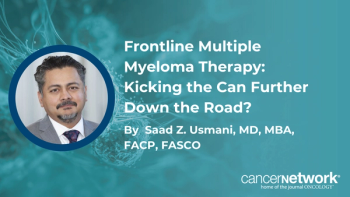
Revumenib Elicits Favorable Efficacy in mNPM1 Acute Myeloid Leukemia
Developers are expected to file a supplemental NDA for revumenib in NPM1-mutated AML in the first half of 2025.
Revumenib met its primary end point of complete remission and complete remission with partial hematological recovery (CR/CRh) rate and achieved responses in patients with relapsed or refractory NPM1-mutant acute myeloid leukemia (AML), according to a press release from the drug’s developer, Syndax Pharmaceuticals.1
Updated findings from the
Pending the potential FDA approval of revumenib in relapsed/refractory KMT2A-rearranged acute leukemia, Syndax is expected to file a supplemental new drug application (NDA) for a NPM1-mutated AML indication in the first half of 2025.
"Relapsed or refractory [NPM1-mutated] AML is a very challenging disease with a poor prognosis and an urgent need for new treatments," Eytan M. Stein, MD, chief of the Leukemia Service at Memorial Sloan Kettering Cancer Center, said in the press release.1 "The positive results for revumenib in this heavily pre-treated population, which included more than 75% who previously [progressed on] venetoclax [Venclexta], are encouraging. In particular, the robust rates of overall response, including deep molecular remissions and low discontinuation rates, highlight the tremendous promise of revumenib in the treatment of [patients with relapsed/refractory NPM1-mutated] AML."
The phase 2 AUGMENT-101 trial enrolled patients with KMT2A-rearranged acute lymphoblastic leukemia (ALL) or mixed phenotype cute leukemia (MPAL), KMT2A AML, and NPM1-mutated AML to receive oral revumenib.2 In patients evaluable for efficacy with relapsed/refractory NPM1-mutated AML (n = 64), the median age was 65 (range, 19-84), and patients were heavily pretreated, with a median of 2 prior lines of therapy and 36% having received 3 or more prior lines. Additionally, 75% of the NPM1-mutated AML cohort received prior treatment with venetoclax.
The safety population consisted of adult and pediatric patients within the NPM1-mutated cohort (n = 84). The safety data reported in this cohort aligned with previously reported data.
Median duration of CR/CRh responses was 4.7 months (95% CI, 1.2-8.2) at data cutoff, with 3 patients remaining in response. Of the 5 patients who underwent HSCT following treatment, 3 continued revumenib post-transplant.
Safety data reveal that treatment-related adverse events (TRAEs) leading to discontinuation occurred in 4 patients (5%) evaluable for safety. Additionally, grade 3 TRAEs occurring in more than 10% of patients included QTc prolongation (21%), anemia (14%), febrile neutropenia (13%), differentiation syndrome (DS; 13%), and decreased platelet counts (11%). There were 9 (11%), 2 (2%), and 0 (0%) instances of grade 3, 4, and 5 DS, respectively, and 16 (19%), 2 (2%), and 0 (0%) instances of grade 3, 4, and 5 QTc prolongation among patients with NPM1-mutated AML.
"We are thrilled to report positive pivotal data in [patients with relapsed/refractory NPM1-mutated] AML treated with revumenib, which has shown compelling and notably consistent results across treatment settings for both [NPM1-mutated] AML and KMT2A-rearranged acute leukemias," Michael A. Metzger, chief executive officer of Syndax, said in the press release.1 "With the anticipated FDA approval of revumenib for the treatment of [relapsed/refractory] KMT2A-rearranged acute leukemias this quarter, and this second positive pivotal data readout, we are well-positioned to meaningfully impact the estimated 40% of [patients with] AML with these two genetic alterations."
References
- Syndax announces positive pivotal topline results from relapsed or refractory mNPM1 AML cohort in AUGMENT-101 trial of revumenib. News release. Syndax Pharmaceuticals. November 12, 2024. Accessed November 13, 2024. https://tinyurl.com/mcnk8mux
- A study of revumenib in R/R leukemias including those with an MLL/KMT2A gene rearrangement or NPM1 mutation (AUGMENT-101). Updated October 16, 2024. Accessed November 13, 2024. https://tinyurl.com/2t48nmns
Newsletter
Stay up to date on recent advances in the multidisciplinary approach to cancer.






































